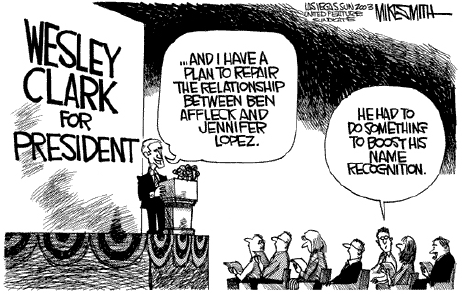|
|
|
 |
 |
 |
 |
US PRESIDENTIAL ELECTIONS |
 |
|
|
For the following lessons, you will work through the WebQuest given below. Read the assignments carefully, do your best - and keep in mind, that this is not going to be a test in your ability in using drag & drop!
|
|
|
|
US PRESIDENTIAL ELECTIONS 2004
|
A WebQuest
Designed by Uwe Klemm
uwe at klemm-site dot de
 Introduction | Introduction |  Task | Task |  Process | Process |  Evaluation | Evaluation |  Conclusion | Conclusion |  Credits Credits
|
Introduction
|
Through this webquest, you are supposed to gain insight into the procedure of electing a US president, get to know some of the candidates for the 2004 elections and their agendas and judge their chances for election.
|
Task
|
Using the resources given below, try to understand the procedure that is employed in the election of a US president. Deal with candidates and their views / promises and react towards one of the candidates.
|
Process
|
You are supposed to work in teams and split the work that has to be done. So first gather in teams of 3 or 4 people. Go through the following assignments and assign specific responsibilties within the team, so that each of you is able to answer one of the following tasks. As a group, you then prepare a portfolio (with the name of the respective authors below each "chapter" and an appendix giving the sources you used) which you have to hand in (use my "Kopierstelle" on server Gaia). While you do your research work, you might want to store useful links in the  LinkBase. LinkBase.
Your research tasks:
|
|
|
 |
(1) Create a flowchart that explains the procedure of electing a US president. Include dates where applicable, also include the constitutional requirements that a candidate has to meet.  Brief introduction Brief introduction
|
 |
(2) Make up a table comparing some major candidates and their agendas. Take the Republican candidate, George W. Bush, 2 Democratic candidates (one of them must be Wesley Clark) and one third-party candidate. Give a short biography of each of them. Compare their agendas on the following topics: economy, welfare and health care, education, foreign politics / security.
|
 |
Sources:  Election at "Washington Post" online Election at "Washington Post" online
|
 |
 USA today USA today
|
 |
 George W. Bush's Website George W. Bush's Website
|
 |
 Wesley Clark's website Wesley Clark's website
|
 |
(3) Choose one of the candidates mentioned above and analyze how this candidate uses modern media for his campaign (websites, weblogs, maillists...).
|
 |
(4) Find out about the costs for running a campaign and where this money comes from.
|
 |
(5) Taking into account all the information gathered so far, choose the candidate that you - if you were a citizen of the US - would give your vote. Write an e-mail to the candidate in which you explain, why you think he'd be the one who should run the country. You might want to add some criticism or proposals to change the one or other item in his agenda.Alternatively, you might choose the candidate you agree with least and write an explanatory e-mail to him.This e-mail is a mandatory task for everyone! It should have at least 150 words. For the E-mail, please use the form at the bottom of this page.
|
|
|
|
|
Evaluation
|
Your writings will be marked using the common grading guidelines for written work in the Oberstufe. You are expected to create texts of your own, extensive copying from the original sources will result in loss of credit in your evaluation.
In addition, the following table will give you some hints on what exactly is ecpected for each task.
|
|
|
|
just the most basic facts, in parts faulty, incomplete
|
basic facts are mentioned, partly incomplete, some minor faults
|
almost complete, accurate, shows deep understandig of subject
|
completely correct, in-depth analysis,
|
12
|
|
not very coherent, just fact after fact
|
in parts coherent, some understanding of a well-structured text
|
well-structured text, coherent, variety of link words etc
|
fluent argumentation, fairly complex, tightly interwoven
|
8
|
|
a number of mistakes that inhibit comprehension, and / or extensive copying from original texts
|
some mistakes that occasionally inhibit understanding, some copying
|
fluent text, fairly wide range of vocab, minor mistakes, stylistically appropriate
|
very fluent, wide range of vocab, register, almost 100% language of your own, stylistically accurate
|
10
|
|
just some opinions, not coherently presented, argumentation not convincing, stylistically inappropriate
|
basic development of argumentation, some reasoning, in parts convincing
|
coherent argumentation, comprehensible and mostly convincing, a number of aspects included
|
mature judgement, in-depth, well-reasoned, complex
|
10
|
|
a number of mistakes that inhibit understanding, fairly straightforward, limited vocab
|
some mistakes occasionally limit understanding, some choice of vocab and structures
|
fluent, quite some range of vocab and structures, stylistically engaging
|
very fluent, wide range of vocab and structures, some stylistic delicacy
|
12
|
|
Conclusion
|
By the end of the webquest, I hope you will have understood the basic principles of choosing a president in the USA - or POTUS for short. We will follow the elections in class, of course, and compare the results with our expectations :-)
|
Credits
|
Apart from the links used within the Process part, I used a cartoon taken from  www.cagle.com. www.cagle.com.
The Structure of the Webquest is based upon a template from the  WebQuest Page. WebQuest Page.
|
E-mail to the Candidate
|
|
 Cambridge Advanced Cambridge Advanced
|
|


